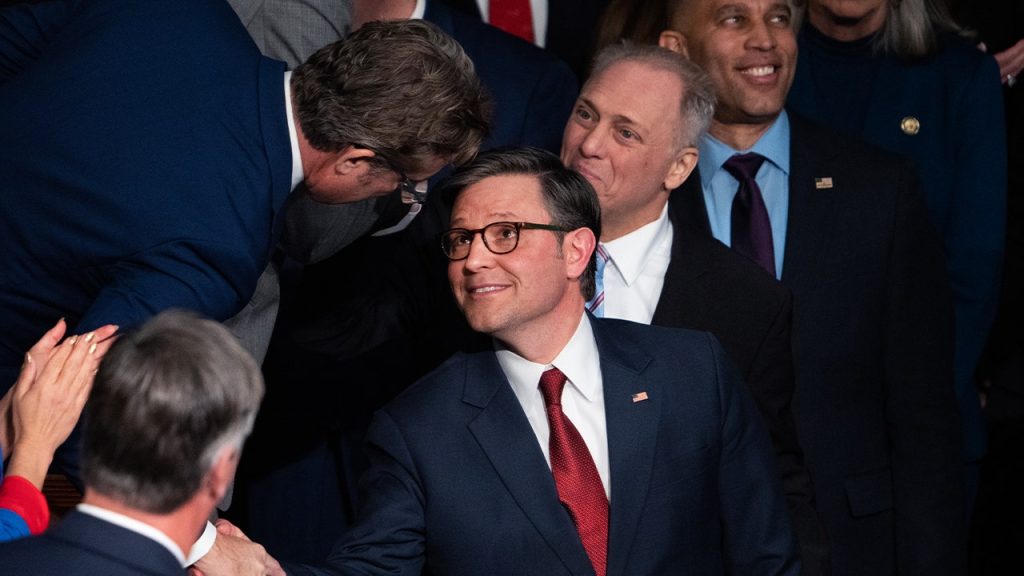The re-election of Representative Mike Johnson as Speaker of the House for the 119th Congress elicited a wave of mixed reactions from Democratic lawmakers, oscillating between initial apprehension and eventual acceptance. The drama unfolded on Capitol Hill as lawmakers convened to cast their votes, with the initial round revealing cracks within the Republican party. While Johnson ultimately secured the speakership, the path to victory was not without its bumps, as several GOP members initially withheld their support, foreshadowing potential disarray and gridlock. This initial dissent prompted swift reactions from Democrats, many of whom took to social media to express concerns about the Republican party’s internal struggles and the potential implications for effective governance.
As the first round of voting commenced, three Republican representatives cast their ballots for candidates other than Johnson, fueling Democratic anxieties about the GOP’s ability to unite behind a single leader. This division prompted some Democratic representatives to publicly express their concerns, characterizing the situation as a “GOP Civil War” and lamenting the potential for continued dysfunction within the House. Some Democrats expressed hope that the new Congress could move beyond the partisan struggles of the past and focus on addressing the needs of the American people, but the initial voting results appeared to dash those hopes, suggesting a continuation of the protracted battles that had characterized previous speaker elections.
However, the narrative shifted dramatically after a brief meeting within the Republican cloakroom. Representatives Ralph Norman and Keith Self, who had initially voted against Johnson, reversed their positions, providing the necessary votes to secure Johnson’s speakership in a single round. This unexpected turn of events prompted a marked change in the tone of Democratic responses, with several members acknowledging Johnson’s accomplishment and contrasting it with the protracted and contentious speaker election of January 2023, which had required fifteen rounds of voting.
The swift resolution of the speakership vote, in stark contrast to the previous year’s drawn-out battle, seemed to take some Democrats by surprise. Several expressed relief that the process had concluded quickly, allowing the House to move forward with its legislative agenda. Some jokingly remarked on the unexpected efficiency of the process, while others reiterated their hope for bipartisan cooperation on pressing issues facing the nation. The rapid shift from apprehension to acceptance underscored the volatile nature of political dynamics and the ever-present possibility of unexpected outcomes.
Despite the initial uncertainty and the public airing of concerns, Democratic lawmakers ultimately rallied behind their own leader, Representative Hakeem Jeffries of New York, offering unanimous support in the speaker vote. This demonstration of unity within the Democratic caucus contrasted with the initial divisions within the Republican ranks, further highlighting the shifting power dynamics within the House. While acknowledging Johnson’s victory, some Democratic members also pointed to a backlog of bipartisan legislation awaiting action, urging the newly elected Speaker to prioritize these bills and demonstrate a commitment to working across the aisle.
Following the conclusion of the speakership vote, a more conciliatory tone emerged from several Democratic representatives. Some extended congratulations to Johnson, emphasizing the importance of bipartisan cooperation in addressing critical issues facing the country. They called for immediate action on pending legislation related to housing affordability, prescription drug costs, and border security. This shift towards a more collaborative approach suggested a willingness on the part of some Democrats to engage with the new Speaker and seek common ground, despite the earlier expressions of concern. The overall response from Democrats demonstrated a complex mix of anxieties, cautious optimism, and a pragmatic desire to move forward with the business of governing.

